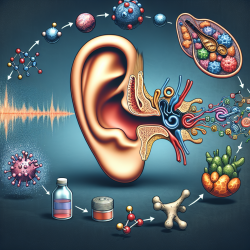Introduction
In the realm of speech-language pathology, understanding the intricate effects of noise trauma on auditory health is crucial. Recent advancements in auditory metabolomics have opened new pathways to explore the molecular impacts of noise exposure on the cochlea. The study titled "Auditory metabolomics, an approach to identify acute molecular effects of noise trauma" sheds light on this complex interplay, offering valuable insights for practitioners aiming to enhance their therapeutic approaches.
Understanding the Research
The study utilized liquid chromatography-coupled tandem mass spectrometry (LC-MS/MS) to analyze the effects of noise on the mouse inner ear. Mice were exposed to noise levels that induced temporary threshold shifts, synaptopathy, and permanent hidden hearing loss. The analysis revealed significant changes in 40 metabolites, highlighting pathways related to neurotransmission and oxidative stress.
This research underscores the importance of metabolomics in characterizing the molecular changes induced by auditory trauma. By identifying noise-modulated metabolites and pathways, it paves the way for developing novel therapies for noise-induced hearing loss.
Implications for Practitioners
For practitioners in the field of speech-language pathology, these findings emphasize the need to consider molecular changes when addressing auditory health. Here are some actionable steps:
- Integrate Metabolomics Insights: Utilize the knowledge of noise-modulated metabolites to inform therapy plans, particularly for clients with noise-induced hearing loss.
- Focus on Prevention: Advocate for noise exposure prevention strategies, emphasizing the molecular damage that can occur even at moderate noise levels.
- Encourage Further Research: Engage in or support further research to explore potential therapeutic targets identified through metabolomics.
Conclusion
As the field of speech-language pathology continues to evolve, integrating data-driven insights from studies like this one is essential for advancing therapeutic outcomes. The comprehensive metabolomics approach not only enhances our understanding of noise-induced auditory trauma but also opens new avenues for intervention.
To delve deeper into the original research, please follow this link: Auditory metabolomics, an approach to identify acute molecular effects of noise trauma.










